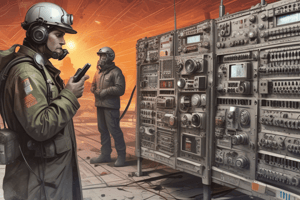Podcast
Questions and Answers
When taking a dispatch call, which of the following is NOT a crucial detail to gather?
When taking a dispatch call, which of the following is NOT a crucial detail to gather?
- The caller's name.
- The caller's favorite color. (correct)
- Whether someone is injured.
- The nature of the emergency.
Asking if the suspect is still on scene is only relevant if the caller is a witness.
Asking if the suspect is still on scene is only relevant if the caller is a witness.
False (B)
What information should be obtained to ensure the caller can be contacted back if the call is disconnected?
What information should be obtained to ensure the caller can be contacted back if the call is disconnected?
A telephone number that can be used to contact the caller back.
The dispatcher should ask if the suspect is under the influence of ______ or ______ to better assess the situation.
The dispatcher should ask if the suspect is under the influence of ______ or ______ to better assess the situation.
Match the following questions to the corresponding element on the dispatch checklist:
Match the following questions to the corresponding element on the dispatch checklist:
Flashcards
Emergency Location
Emergency Location
The specific description of where the emergency is occurring, including details like apartment number.
Caller’s Name
Caller’s Name
The name of the individual making the emergency call to provide identity and establish connection.
Contact Number
Contact Number
A telephone number provided by the caller for follow-up contact in case the call disconnects.
Injuries and Ambulance Need
Injuries and Ambulance Need
Signup and view all the flashcards
Witness or Involved Party
Witness or Involved Party
Signup and view all the flashcards
Study Notes
Dispatcher Questions Checklist
- Location of Emergency: Gather the precise location of the incident, including building address, apartment number, and description of the location.
- Caller's Name: Obtain caller's name.
- Contact Information: Obtain a valid phone number for the caller to allow follow-up if the initial line drops.
- Nature of the Emergency: Determine the type of incident (e.g., medical emergency, disturbance, accident)
- Injury and Ambulance: Establish if someone is injured and needs an ambulance.
- Caller's Involvement: Inquire if the caller was involved in the incident. If not, is the caller a witness?
- Suspect Information: Obtain details if there is a suspect present. This includes the suspect's name, description of clothing, direction of travel if they left, and method of travel.
- Weapons: Determine if weapons are involved. If so, the type of weapon must be noted.
- Substance Use: Identify if the suspect or victim is under the influence of drugs or alcohol. Specify the substance.
- Children Present: Inquire if children are present, and if so, the number of children and their ages.
- Other Persons Present: Determine if other individuals are at the location, and count their number if present.
- Previous Encounters: Ascertain if law enforcement has been dispatched to the location previously. Note the date and nature of previous calls if applicable.
- Protection Order: Establish if a current protection order is in effect for the victim.
Studying That Suits You
Use AI to generate personalized quizzes and flashcards to suit your learning preferences.




